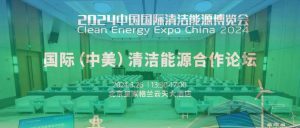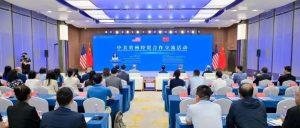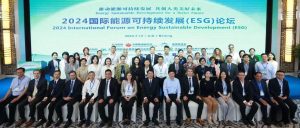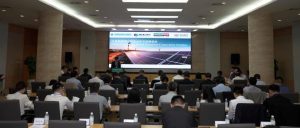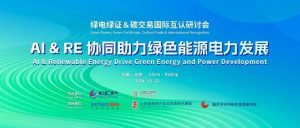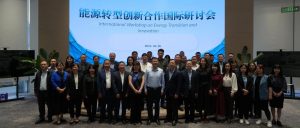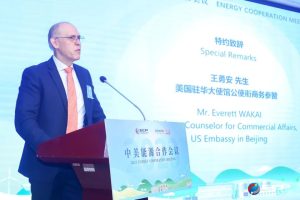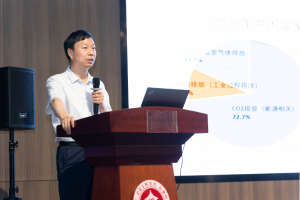On December 17, 2024, the Energy Cooperation Meeting and ECP 15th Anniversary Reception were held in Beijing. Over 120 guests from energy and business-related government agencies of both China and the U.S., leading domestic and international energy and technology companies, renowned research institutions, and authoritative industry associations gathered to share insights and discuss the future of U.S.-China and global energy cooperation and development.
ECP Board Co-Chair Yang Yumin and Michael Hart, President of AmCham China, delivered welcome remarks. Special remarks were made by Everett Wakai, Minister Counselor for Commercial Affairs at the U.S. Embassy Beijing; Xiong Minfeng, Deputy Director General of the New Energy and Renewable Energy Department of National Energy Administration (NEA); and Kaitlin Oujo, Director of China office of U.S. Department of Energy. The speakers congratulated ECP on its 15th anniversary, reviewed and affirmed the positive contributions of ECP to U.S.-China energy cooperation over the past 15 years, and provided their positive expectation and guidance for the next 15 years of bilateral energy collaboration.
Everett Wakai highlighted the crucial role of ECP in fostering U.S.-China investment and trade, advancing China’s clean energy market, and creating more collaboration opportunities for enterprises in the energy sector. Although the past 15 years have seen major changes in the U.S.-China relationship, and the global economy, ECP has remained committed to its mission, consistently advancing clean energy development and facilitating more sustainable business and trade opportunities for both nations.
Everett Wakai acknowledged that the dynamics of U.S.-China cooperation have shifted, but emphasized the importance of looking forward and identifying new opportunities. He underscored that this is an opportune moment for innovative thinking, enabling the exploration of opportunities from fresh prospects. Looking ahead, Everett Wakai stressed the need to deepen collaboration and investment in the energy sector, expressing hope for a brilliant future over the next 15 years and beyond, with greater investment and trade opportunities for both nations.
Xiong Minfeng stated that over the past 15 years, ECP has played a critical role as an important bridge connecting the governments and enterprises of the U.S. and China. With the active involvement and promotion of cooperation platforms like ECP, a series of significant energy cooperation projects have successfully been implemented, deeply integrating the energy interests of both countries and achieving mutually beneficial results.
Both China and the U.S. are major energy producers and consumers, with broad common interests in ensuring energy security and advancing energy transitions. As the global energy transition deepens, U.S.-China cooperation plays an indispensable role in overcoming transformation bottlenecks and enhancing new development momentum. Creating an open and stable energy framework for China and the U.S. is crucial for ensuring the energy future of both countries’ 1.7 billion people and driving global energy development.
Xiong Minfeng also emphasized that enterprises, including U.S. companies, should seize new opportunities in China’s energy development. NEA will continue to support both countries’ enterprises in following the principle of mutual benefit, expanding and deepening practical cooperation across various sectors, using friendly industry interactions to dispel misunderstandings and biases, and promoting steady and long-term U.S.-China economic and trade relations through strong mutually beneficial cooperation.
Kaitlin Oujo pointed out that ECP is a successful model of public private partnerships. It bridges the gap between government and industry and created pathways for collaboration that neither sector could achieve alone. ECP has a unique convening power, bringing together companies, ministries and officials from both the United States and China. Its ability to engage both governments and private enterprises has created a foundation for meaningful dialogue and actionable solutions.
Looking ahead, Kaitlin Oujo shared some of the efforts made by the U.S. Department of Energy (DOE) in leading the energy transition. She believes that businesses will be key partners for governments in driving the energy transition. ECP is a vital platform that can strengthen energy security, promote economic cooperation, and expand the vision of ensuring access to clean energy for all. DOE will continue working closely with various departments to identify and implement solutions that benefit both countries.
During the Keynotes session, several industry experts, scholars, and business executives delivered insightful talks on key issues in the energy sector. An Fengquan from the Institute for Climate Change and Sustainable Development at Qingdao University of Science and Technology provided an in-depth interpretation of China Energy Law, clarifying the background, legal framework, and development direction of China’s energy policy. Guo Yanheng, Deputy Chief Engineer, China Renewable Energy Engineering Institute (CREEI), introduced China’s practice of renewable energy green electricity certificate, sharing valuable experience in promoting green energy consumption. Hou Mingyang, Deputy Director of the Planning Department at the Sinopec Petroleum Exploration and Development Research Institute, reviewed and looked ahead to U.S.-China LNG trade cooperation, analyzing the current trade situation and future development potential. Guo Mingjun, Director of the Computing Power Department at the National Information Center, presented unique insights into the collaborative innovation development of computing and electricity, exploring new models of integration and innovation between the computing and electricity sectors. Bao Yi, Vice President and General Manager of the Energy Innovation Department at VNET, focused on green DC-driven new computing power energy infrastructure, discussing research outcomes and application prospects in this field.
In the “Energy Transition and International Cooperation- Policy Exchange and Dialogue”, Yang Lei, the vice president of the Energy Research Institute at Peking University, hosted a discussion with Wang Hongyan, Deputy Director General of the National Energy Shale Gas R&D (Experiment) Center; Chen Jingdong, Chairman of the Energy Finance and Law Committee at the China Energy Research Society; and Pang Guanglian, Executive Board Member and Chairman and Secretary General of Committee of Multinationals, at China Petroleum and Chemical Industry Federation(CPCIF). The guests discussed international energy cooperation policies, sharing updates and progress in their respective areas of expertise, and engaging in deep exchanges on topics such as energy transition, international cooperation mechanisms, and policy coordination. They shared their experiences and insights on policy formulation and advancing international cooperation projects, offering policy-level reflections and suggestions for strengthening international energy cooperation.
The subsequent “US-China Energy Cooperation-Industrial Exchange and Dialogue” was hosted by Chen Jie, Senior Director of Solution Consulting at AspenTech. The dialogue featured Sun Peng, Deputy General Manager of the Eighth Engineering Equipment Department at China Machinery Engineering Corporation (CMEC); Scott Roberts, Senior Director for Asia Technology and Sales, Westinghouse; and Yang Yumin, Vice President of Commercial, and Government Affairs and Communications at ConocoPhillips China. They discussed new opportunities for U.S.-China energy industry cooperation from the business perspective, covering energy technology innovation, project investment cooperation, market expansion, and other areas, providing practical ideas and directions for deepening U.S.-China energy industry cooperation.
The successful hosting of the 2024 Energy Cooperation Meeting and the ECP 15th Anniversary Reception not only witnessed ECP’s relentless efforts and outstanding achievements in promoting U.S.-China energy cooperation but also facilitated in-depth dialogues and cooperation in policies, technologies, and industries, injecting new momentum for future development. ECP looks forward to working with more partners to help drive a green, low-carbon sustainable future amid the accelerating global energy transition and starting a new chapter in international energy cooperation for the next 15 years.

